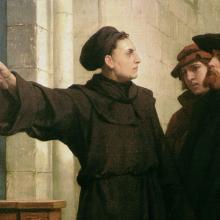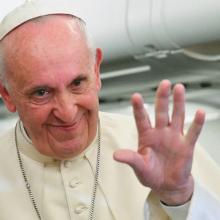95 Theses
Amid ceremonies this year marking the 500th anniversary of the Reformation, one of Protestantism’s leading branches has officially said it now agrees with the Vatican on the main issue at the root of its split from the Roman Catholic Church half a millennium ago.
All was apparently going fine until Micha Brumlik, a retired Frankfurt University education professor and respected Jewish commentator, wrote last June that the popular toy was “anti-Jewish, if not even anti-Semitic.”
The problem, he said, was the inscription on the open pages of the Bible that the Playmobil Luther holds. On the left is written in German: “Books of the Old Testament. END,” while the right page says “The New Testament, translated by Doctor Martin Luther.”
Tackling a delicate issue, as it begins its yearlong celebration of the Reformation’s 500th anniversary, Germany’s main Protestant church has officially renounced its mission to convert Jews to Christianity.
In practice, the Evangelical Church in Germany (EKD), made up of 20 regional Lutheran, Reformed, and United churches, mostly gave up efforts to convert Jews in the decades after the Holocaust, and closing that chapter should have been a formality.
Even by this pope’s standards it was a bold move.
Francis, the spiritual leader of more than a billion Roman Catholics across the globe, this week traveled to Sweden, one of the most secularized countries in Europe, to take part in events marking 500 years since Martin Luther kickstarted the Protestant Reformation.
Some Protestant churches mark the day as Reformation Sunday, and celebrate it on the Sunday just before, or just after, Oct. 31. More often than not, the hymns sung in church that day include “A Mighty Fortress Is Our God,” with words and music composed by Luther himself. But most members of Lutheran churches — the direct descendants of Luther’s movement — wait until Oct. 31. And that, as we know, is also Halloween, and has led to some creative celebrations for kids.
Pope Francis leaves on Monday, Oct. 31 for an overnight trip to Sweden, a historically Protestant country that today is one of the most secular in the world.
The visit is to mark the start of observances of next year’s 500th anniversary of the Reformation, which traditionally dates from Oct. 31, 1517, when Martin Luther nailed his 95 Theses to the door of a German cathedral.
On Monday, Oct. 31, in Sweden, Pope Francis will take part in an ecumenical service commemorating the beginning of the Protestant Reformation’s 500th year.
It is stunning to think the start of this momentous anniversary features a visit from the Roman pope.
And it raises a question: Does the Reformation still matter?
Nearly 500 years after Martin Luther nailed his 95 theses to the Castle Church door, the largest Lutheran denomination in the U.S. has approved a declaration recognizing “there are no longer church-dividing issues” on many points with the Roman Catholic Church.

Image via Molodec/Shutterstock.com
Oct. 31 is approaching quickly — a day marked throughout the United States by costume contests, pumpkin carvings, and children knocking on neighbors’ doors with questions of “trick or treat?”
But for Protestant churches around the world, Oct. 31 is also a celebration of a grown man knocking on a (rather large) door, asking a different question of the Catholic Church:
From whom does salvation truly come? And a follow-up: How do we refocus the church on the Gospel?
On this date, almost 500 years ago, Martin Luther hammered his 95 Theses onto the front doors of All Saints’ Church in Wittenberg, Germany — an act that, unforeseen by Luther at the time, is now credited with beginning the Protestant Reformation. Luther’s 95 Theses outlined his abstentions to the practice of selling indulgences to guarantee Christians salvation, emphasizing that grace is given by God alone and can only be assured by the clergy, not bought from them.
With the help of the social media of his day — the newly-improved printing press — news quickly spread to people throughout Europe that Martin Luther was questioning the papacy and attempting to refocus the church’s theology on forgiveness through the word and the eucharist, neither of which required financial prosperity. Within a few years, Martin Luther was excommunicated from the Catholic Church for his continued teachings, which included suggestions that the Bible should be accessible to all people and that priests not necessarily need to be celibate.
The Reformation gathered Christians from across Europe into a community of “rebels,” from which multiple denominations would spring up over the next half a century.
Today, 498 years later — with of a Catholic pope nicknamed “The Peoples’ Pope,” who is on Twitter and preaches about income inequality — what would Luther think of the state of the church?
Today is the day we remember the Protestant Reformation. On Oct. 31, 1517 Martin Luther, my denomination’s namesake, nailed his 95 Theses on the church door in Wittenburg. It was the beginning of a new movement that brought many changes to the Christian church. Perhaps the change I am most thankful for (other than a new awareness of justification by faith alone, simul iustus et peccator, and imputed righteousness of course) is that the Reformation paved the way for the Bible to be placed in the hands of the people. Before Luther’s German translation was completed in 1534, which happily coincided with advancements in the printing press, it was virtually impossible for any non-clergy Christians to get ahold of, much less read, the book we take for granted.
Individual faith and the ability to study this book for ourselves is a benefit we don’t even stop to consider. I grew up with more Bibles in my home than we could ever use and have countless different versions now in my office. And yes, there are still some places where access to information and printed text is hard to come by, but at least here, God’s Word is always at our fingertips, if we want it to be.
DURHAM, N.C. — Protestants have traditionally celebrated Oct. 31 as the anniversary of the start of the Protestant Reformation, a movement that divided Western Christendom and gave birth to such diverse religious groups as Lutherans, Presbyterians, Anglicans, and Mennonites.
On Oct. 31, 1517, an Augustinian friar named Martin Luther nailed 95 theses for debate on the door of the Castle Church in Wittenberg, Germany, and so sparked a religious reform even he could not control.
But Luther's public life actually began five years earlier, 500 years ago this week, on Oct. 19, 1512, when he finished his formal theological education and was installed as a professor of Bible at a relatively new and still nonprestigious Catholic university in Saxony.
No one, least of all his patrons, expected this soft-spoken young man with a tenor voice and a bubbling sense of humor to turn into a religious bomb thrower, whose theological convictions would alter the religious and political structures of Europe for five centuries. Indeed, no one could have been more astonished by this unexpected development than Luther himself.
When I was ordained as a "Minister of Word and Sacrament" in the Reformed Church in America, a denomination that began in 1628, I imagined that I was being ordained to a church that was "reformed and always reforming!" (Emphasis mine).
Reformata et semper reformanda was a theme of the Reformation, which Martin Luther kicked off on Oct. 31, 1517 when he nailed his Ninety-Five Theses to front door of Castle Church of Wittenberg, Germany.
But rather than reviewing history from a half-millennia ago, let me explain what I hoped for 22 years ago, when I was ordained.









